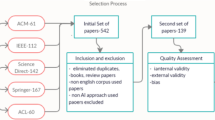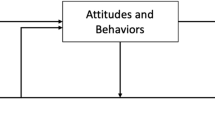Abstract
This paper describes a study examining how mathematics anxiety, test anxiety, and communication apprehension are related to student behavior in courses using standards-based grading. An observational study of mathematics courses with 221 participants found that test anxiety increased over the semester although many students reported lower stress or anxiety in an open-ended survey question. Mathematics anxiety and test anxiety were positively correlated with the number of voluntary reassessments students attempted, while communication apprehension was negatively correlated. These findings indicate that standards-based grading is an assessment framework that can provide alternate methods for some students to demonstrate content mastery. While this study was conducted in mathematics courses, the findings on test anxiety are likely to extend to other disciplines.
Similar content being viewed by others
References
Beatty, I. D. (2013). Standards-based grading in introductory university physics. Journal of the Scholarship of Teaching and Learning, 13(2), 1–22.
Bloom, B. S. (1968). Learning for mastery. Evaluation Comment, 1(2), 1–11.
Boesdorfer, S. B., Baldwin, E., & Lieberum, K. A. (2018). Emphasizing learning: Using standards-based grading in a large nonmajors’ general chemistry survey course. Journal of Chemical Education, 95, 1291–1300.
Brackett, C. C., & Reuning, R. H. (1999). Teaching pharmacokinetics using a student-centered, modified mastery-based approach. American Journal of Pharmaceutical Education, 63, 272–276.
Collins, J. B., Ramsay, A. H., Hart, J., Haymaker, K. A., Hoofnagle, A. M., Janssen, M., et al. (2019). Mastery-based testing in undergraduate mathematics courses. PRIMUS, 29, 441–460.
Duker, P., Gawboy, A., Hughes, B., & Shaffer, K. P. (2015). Hacking the music theory classroom: Standards-based grading, just-in-time teaching, and the inverted class. Music Theory Online, 21(1), 1–23.
Elsinger, J., & Lewis, D. (2019). Applying a standards-based grading framework across lower level mathematics courses. Manuscript submitted for publication.
Gravina, E. W. (2017). Competency-based education and its effect on nursing education: A literature review. Teaching and Learning in Nursing, 12, 117–121.
Guskey, T. R. (2008). Practical solutions for serious problems in standards-based grading. Thousand Oaks, CA: Corwin Press.
Hembree, R. (1988). Correlates, causes, effects, and treatment of test anxiety. Review of Educational Research, 58, 47–77.
Hembree, R. (1990). The nature, effects, and relief of mathematics anxiety. Journal for Research in Mathematics Education, 21, 33–46.
Hopko, D. R., Mahadevan, R., Bare, R. L., & Hunt, M. K. (2003). The abbreviated math anxiety scale (AMAS): Construction, validity, and reliability. Assessment, 10, 178–182.
Huxham, M., Campbell, F., & Westwood, J. (2012). Oral versus written assessments: A test of student performance and attitudes. Assessment & Evaluation in Higher Education, 37, 125–136.
Lee, C. (2019, January). Mastery-based testing: quantitative and qualitative assessment of effectiveness and acceptance. Paper presented at SoTL Commons Conference, Savannah, GA. Retrieved from https://digitalcommons.georgiasouthern.edu/sotlcommons/SoTL/2019/30
Lee, E., Carberry, A., Diefes-Dux, H., Atwood, S., & Siniawski, M. (2017, January). Faculty perception before and after implementation of standard-based grading. In 2017 research in engineering education symposium, REES 2017 (pp. 31–39). Bogota, Columbia: Research in Engineering Education Network.
Lewis, D. (2019). Gender effects on re-assessment attempts in a standards-based grading implementation. PRIMUS. https://doi.org/10.1080/10511970.2019.1616636.
McCroskey, J. C. (1977). Oral communication apprehension: A summary of recent theory and research. Human Communication Research, 4, 78–96.
McCroskey, J. C. (2015). An introduction to rhetorical communication. New York, NY: Routledge.
Nilson, L. (2015). Specifications grading: Restoring rigor, motivating students, and saving faculty time. Sterling, VA: Stylus.
Putwain, D. (2008). Do examinations stakes moderate the test anxiety–examination performance relationship? Educational Psychology, 28, 109–118.
Schwarzer, R. (1990). Current trends in anxiety research. European Perspectives in Psychology, 2, 225–244.
Segool, N. K., Carlson, J. S., Goforth, A. N., Von Der Embse, N., & Barterian, J. A. (2013). Heightened test anxiety among young children: Elementary school students’ anxious responses to high-stakes testing. Psychology in the Schools, 50, 489–499.
Stange, K. E. (2018). Standards-based grading in an introduction to abstract mathematics course. PRIMUS, 28, 797–820. https://doi.org/10.1080/10511970.2017.1408044.
Taylor, J., & Deane, F. P. (2002). Development of a short form of the Test Anxiety Inventory (TAI). The Journal of General Psychology, 129, 127–136.
von der Embse, N., Jester, D., Roy, D., & Post, J. (2018). Test anxiety effects, predictors, and correlates: A 30-year meta-analytic review. Journal of Affective Disorders, 227, 483–493.
Author information
Authors and Affiliations
Corresponding author
Additional information
Publisher’s Note
Springer Nature remains neutral with regard to jurisdictional claims in published maps and institutional affiliations.
Rights and permissions
About this article
Cite this article
Lewis, D. Student Anxiety in Standards-based Grading in Mathematics Courses. Innov High Educ 45, 153–164 (2020). https://doi.org/10.1007/s10755-019-09489-3
Published:
Issue Date:
DOI: https://doi.org/10.1007/s10755-019-09489-3




